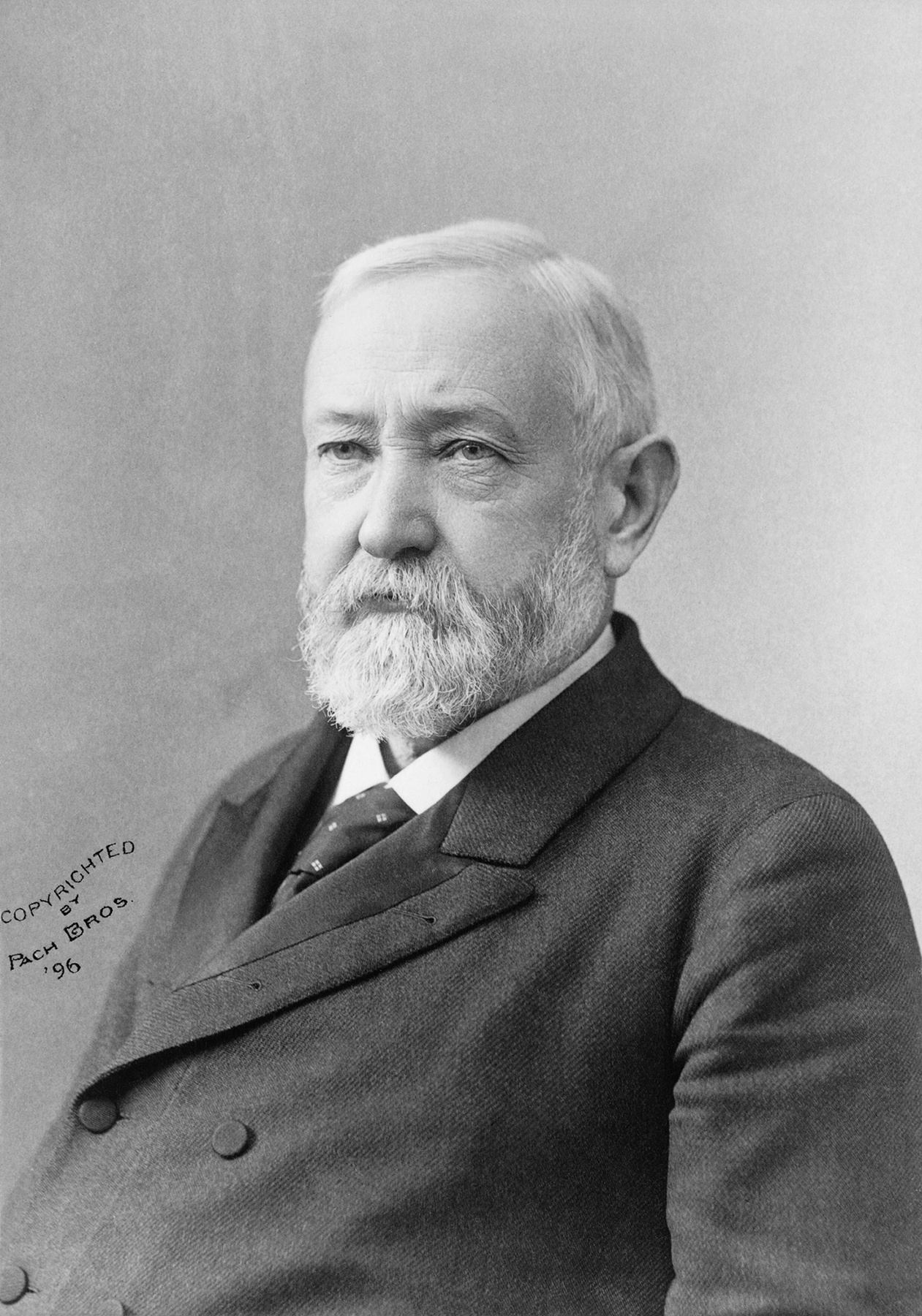Benjamin Harrison is best known as the 23rd president of the United States. He was the grandson of President William Henry Harrison.

Benjamin Harrison, the 23rd president of the United States, was born on August 20, 1833, in North Bend, Ohio. He came from a prominent Virginia family and was the grandson of U.S. President William Henry Harrison. Harrison was elected to the presidency in 1888, ousting Grover Cleveland. He lost the presidency to Cleveland a tumultuous four years later. Harrison died at his home in Indianapolis, Indiana, on March 13, 1901.
Early Life
Benjamin Harrison was born on August 20, 1833, in North Bend, Ohio. The Harrisons were among the First Families of Virginia, with roots stretching back to Jamestown. Benjamin was a grandson of President William Henry Harrison and the great-grandson of Benjamin Harrison V, a signer of the Declaration of Independence.
Harrison attended Farmer’s College, where he met Caroline Scott. In 1850, he transferred to Miami University in Oxford, Ohio. After completing college, Harrison studied law and eventually established his own practice. He then married Caroline Scott and the couple later had two children, Russell Benjamin Harrison and Mary “Mamie” Scott Harrison.
Harrison joined the Republican Party shortly after its formation in 1856, campaigning for national candidates and participating in local races. War interrupted Harrison’s political aspirations. He joined the Union Army as an officer, participating in William Tecumseh Sherman’s Atlanta Campaign. By the war’s end, he had reached the rank of brigadier general.
Early Political Career
Harrison resumed his political career after 1865. Following several unsuccessful runs for office, he was elected to the United States Senate in 1880. He supported the Republican Party positions of generous pensions for veterans and education for free blacks. Harrison broke with his party, however, to oppose the controversial Chinese Exclusion Act of 1882.
In 1885, Harrison was defeated in his bid for re-election. He would not to be out of the spotlight for long, however: As the presidential election of 1888 approached, the Republican Party found itself without a clear candidate after favorite James G. Blaine withdrew his name from contention. Harrison was nominated on the eighth ballot to run against President Grover Cleveland. As a running mate, the convention selected Levi P. Morton.
Harrison ran a front porch campaign, receiving delegations and delivering speeches without traveling far afield. In the end, he prevailed in an election fraught with corruption, winning the Electoral College while losing the popular vote.
U.S. Presidency
Harrison was sworn into office on March 4, 1889. Among the major issues facing his administration were civil service reform, the administration of Civil War pensions and the regulation of tariffs. The spending policies of the federal government during Harrison’s term earned the legislative branch the moniker “the Billion Dollar Congress.”
The problems of currency reform and economic equity were also matters that Harrison was compelled to address. As president, Harrison signed the Sherman Antitrust Act into law in an effort to curtail monopolies. The question of monetizing silver also demanded government attention. Although Harrison signed a compromise bill, the controversy over currency continued to rage throughout his presidency. He also attempted, unsuccessfully, to enact legislation protecting and extending the civil rights of black Americans.
The United States, now past the Civil War, had not resolved its relationship to its Native American inhabitants by the time Harrison had taken office. On December 29, 1890, federal troops clashed with the Sioux at the Battle of Wounded Knee, killing nearly 150 men, women and children. Elsewhere, the federal government continued its aggressive policies of assimilation and acculturation.
One of the lasting legacies of Harrison’s presidency was the expansion of the country to include the states of Montana, Washington, Idaho, Wyoming and the Dakotas. While Harrison became enmeshed in the Hawaiian annexation debate at the end of his presidency, the matter remained open into the 1890s.
Economically, the situation was worsening as the election approached. Surplus gave way to deficit as the country spiraled toward financial panic. In 1892, the Democratic Party re-nominated former President Cleveland to run against the unpopular Harrison. The Republicans were weakened by the defection of Western voters to the Populist Party, which promised free silver and an eight-hour workday. Harrison did not campaign on his own behalf, choosing to remain by the side of his ailing wife, who died in October 1892. Two weeks later, former President Cleveland prevailed over incumbent President Harrison in the general election.
Final Years
After leaving office, Harrison moved to San Francisco, California, where he taught at Stanford University. In 1896, Harrison married Mary Scott Lord Dimmick, a niece of his late wife. His two adult children disapproved of their father’s marriage to a relative 25 years his junior. The couple had one child together, a daughter named Elizabeth.
Benjamin Harrison died of pneumonia at his home in Indianapolis, Indiana, on March 13, 1901, at the age of 67. He is interred at the Crown Hill Cemetery in Indianapolis, beside both of his wives.
• Benjamin Harrison was an American politician and lawyer who served as the 23rd president of the United States from 1889 to 1893. He was a grandson of the ninth president, William Henry Harrison, creating the only grandfather–grandson duo to have held the office.
• Born: August 20, 1833, North Bend, OH
• Died: March 13, 1901, Benjamin Harrison Presidential Site, Indianapolis, IN
• Presidential term: March 4, 1889 – March 4, 1893
• Buried: Crown Hill Funeral Home and Cemetery, Indianapolis, IN
• Vice president: Levi P. Morton (1889–1893)
• Spouse: Mary Dimmick Harrison (m. 1896–1901), Caroline Harrison (m. 1853–1892)
• First president to have a lighted Christmas tree at the White House.
• First president to be a grandson of another president (W. H. Harrison)
• First president to have electric lighting installed in the White House.
• First president to have his voice recorded.
• First president from Indiana.
